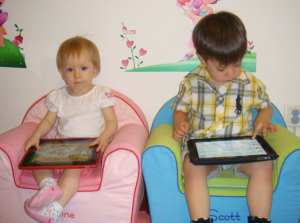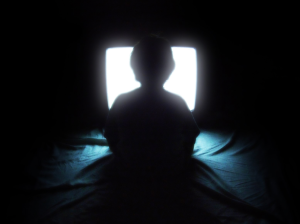32 Entertainment Streaming
Ava Tarzian
32.1 Introduction
- Entertainment streaming- any media content that is delivered to computers and mobile devices via the internet and played back in real time.
- Generation Z- The generational cohort following millennials, born between the late 1990s and early 2010s.
- Obesity- A disorder involving excessive body fat that increases the risk of health problems.
- Mental health- a person’s condition with regard to their psychological and emotional well-being.
- Childhood development- the process by which a child changes over time.
- Melatonin- Hormone that your brain produces in response to darkness. It helps with the timing of your circadian rhythms and with sleep.
Learning Objectives
- By the end of this chapter, students should be able to:
- Learn the background and history of the entertainment industry
- Understand the consequences entertainment streaming can have on mental health
- Why technology should not be given to children at a young age
While binge watching can be a great way to keep the mind distracted, it has grown to have a severe impact on the body as a whole. Not only does it have an effect on sleeping, mental health and children’s youth, it can also lead to severe obesity due to excessive eating and little exercising.
The entertainment streaming industry, which is any source of media that is delivered to devices and played back in real time, is used to keep humans occupied while in states of boredom. Generation Z, born between the late 1990s and early 2010, is brainwashed by the powerful impact of television. The cons of entertainment streaming are hidden from the world and the following information will be addressing ways the body and mind are easily impacted.
32.2 Obesity
Key Takeaways
Binge watching TV shows can promote obesity by taking away physical activity and giving opportunities to snack unhealthily. There is a higher caloric intake and an unhealthy diet when it comes to watching food or beverage ads during commercials. The exposure to fast food commercials and sugary drinks can start obesity for children at a young age.
America has one of the highest obesity rates out of every country in the world. Obesity is a disorder involving excessive body fat that increases the risk of health problems. There is evidence showing that the more television people watch the greater the chance is to gain weight or be prone to obesity (Technical pros and cons). Along with watching TV in a compulsive manner, chronic illness, diabetes, heart disease, and an early death are all alarming factors that come with it (Rosiek, 2015). The addiction to the screen can glue people to the couch for hours. This promotes people to excessive eating and limits them from getting exercise out of the house.

Close-up of Woman Using a Laptop and Snacking By Kübra Arslaner and is licensed under a Pexels license
32.3 Mental Health
Key Takeaways
Mental health, a person’s condition with regard to their psychological and emotional well-being, is a continuous issue within Generation Z. Television shows have allowed people to gain a sense of comfort, but in reality it can do just the opposite. Entertainment streaming can increase anxiety, loneliness, isolation and depression (Centre for Academic Social Action).
It is shown that the average American over the age of 18 can consume at least four hours of Television per day. Levels of dopamine are rapidly producing and stimulating a drug-like high feeling. Anxiety and depression are also created when viewers have a strong attachment to certain characters or shows. The death of a character or finale of a show can affect viewers in a traumatic way. People believe that binge-watching is a cure to healing insecurities and problems in the outside world. Entertainment streaming has created a way to keep humans inside and isolated for multiple days at a time. This can stand in the way of people building connections and being a part of social engagements.

“WORLD MENTAL HEALTH DAY: ’SPEAK UP, DON’T LET THE DEMONS CONSUME YOU” by Current Affairs is licensed under CC BY-NC-SA 4.0
32.4 Effect on Babies Youth
Key Takeaways
A parent’s first resort to keeping their child occupied is handing them an Iphone, Ipad, or some form of technology. Babies’ are just beginning to connect information in their brains, and when technology is given to small children this can affect how their synapses make connections, and deteriorate their development. The process by which a child develops over time will be heavily impacted by the use of entertainment streaming.
Screen time before the age of 2 years old can contribute to sleeping issues, language development, memory and reading problems (Mayanqueen, 2014). The colors and quick motion on the screen can negatively impact their developing brains. Some of the negative effects include, the way kids interact with others, diminished attention span, aggressive behavior, and lack of interest in hands-on education/learning activities.

iPad time by flicker is licensed under CC BY 2.0
32.5 Sleeping Issues
Key Takeaways
The blue light from television, laptop, phone screens create a barrier from the brain that produces melatonin at night. Melatonin is important because it is a hormone that your brain produces in response to darkness. This overstimulation of the brain will make it harder to fall asleep, and can produce higher energy at night. The body will be unable to do basic restoration and repair work for itself (Television watching, 2013). Binge watching TV shows is known to create insomnia for most people and has contributed to many sleeping issues which could result in taking unnecessary medication. This all leads to day drowsiness, and requires time to be taken out of their day to rest. It is important to prioritize getting a full 8-10 hours of sleep.
Sleep deficiency can lead to serious physical health problems. not just loss of productivity, but a higher risk for early death. Sleep is a necessity for proper brain function, maintaining a good healthy physical lifestyle, and Social Development. Electronics affect children’s sleep just as much as adults.

“TV High Quality” by Aaron Escobar is licensed under CC BY 2.0
Horror of Watching Myself Downward Spiral
I unfortunately experienced the heavy impact of binge watching television. Right after freshman year of high school, I needed a way to cope with all of the awful emotions teenage girls experience. The thought of isolation became so comforting, and I began to connect with characters in various TV shows. I did not understand that this comfort was all an illusion. When I attached myself to many shows, I lost all motivation to go to school, eat healthy meals, or leave the house.
Once the series was finished, I felt crushed as if I lost my best friends. I began to eat as a coping mechanism, and lost track of my hunger cues. Along with binge watching, I was binge eating and I couldn’t stop. I felt like I had every ounce of power ripped away from me. I began to spiral, and pulling myself out of it almost felt impossible. The TV hooked me, and I was at risk of diabetes due to how high my blood sugar levels became. It was a scary place, and it is something I never want to feel again. I began watching television in moderation and mindful eating. I was able to get myself back on track and found endless amounts of respect for my body.
Chapter Summary
Binge-watching entertainment is one of the most popular leisure activities in every country. Generation Z has been influenced by many entertainment streaming companies such as Netflix, Hulu, Prime video, which contribute to poor lifestyle habits. Television producers make their shows addicting, with a purpose to hook their viewers, thus destroying their mental and physical health. Sleep schedules have been molded around tv series, children’s development has been impacted, mental health has decreased and obesity rates are increasing. Binge watching TV for hours and hours will spiral humans into their worst version of themselves.
Review Questions
1.What food is snacked on the most while binge watching TV episodes
-
- Carrots and Ranch
- Chips and Soda
- Steak and Mashed potatoes
- Ice water
2.How does using technology at night affect the brain?
-
- Forces you to go out and party
- Makes you believe you are not hungry
- Helps you go to sleep faster
- No more melatonin is produced
3.What is another factor that excessive entertainment streaming can produce?
-
- Aggression
- Compassion
- Respectful
- Sportsmanlike
Answers:
1- 2
2- 4
3- 1
Food For Thought
- What is a way to get out of the cycle of binge watching TV shows?
- How can obesity be prevented when sitting on the couch watching a streaming source like Netflix?
- Do you think giving an iPad or other technology to your child at a young age would be harmful or beneficial?
References
Bailey, C. (2015, August 6). 5 huge lessons I learned binge watching Netflix for a month. 5 Huge Lessons I Learned binge watching Netflix for a Month, Chris Bailey. Retrieved November 5, 2022, from https://chrisbailey.com/experim toddlerent-5-huge-lessons-i-learned-binge watching-netflix-for-an-entire-month/
Depression, emotional states, and the experience of binge-watching narrative television. Taylor
& Francis. (n.d.). Retrieved November 15, 2022, from https://www.tandfonline.com/doi/full/10.1080/15456870.2018.1517765
The netflix effect: Teens, binge watching, and on-demand digital media trends. Jeunesse: Young People, Texts, Cultures. (n.d.). Retrieved November 15, 2022, from https://www.utpjournals.press/doi/abs/10.3138/jeunesse.6.1.119
Mayanqueen, Squirrelers, Retirebyforty, Moneycone, SavvyFinancialLatina, Finance, Y. D.,
House, L., Zimmy, Thriftgenuity.com, G. @, Thepotatohead, Incomes, M. M., Guy, T. D., [Email Protected], Srini, Roundup, G. @ D., Jim, Life, M., Krantcents, Bob, … Zelinski, E. (2014, December 28). Why I’m not getting an iPad for our toddler. Retire by 40. Retrieved November 15, 2022, from https://retireby40.org/no-ipad-for-toddler/
Centre for Academic Social Action. (n.d.). New Era of TV-watching behavior: Binge watching and its psychological effects. Media Watch. Retrieved November 15, 2022, from https://www.indianjournals.com/ijor.aspx?target=ijor%3Amw&volume=8&issue=2&article=005
Rosiek, A., Maciejewska, N. F., Leksowski, K., Rosiek-Kryszewska, A., & Leksowski, Ł. (2015,
August 12). Effect of television on obesity and excess of weight and consequences of health. International journal of environmental research and public health. Retrieved November 15, 2022, from https://www.ncbi.nlm.nih.gov/pmc/articles/PMC4555288/
Technical pros and cons | early years educator. (n.d.). Retrieved November 16, 2022, from
https://www.magonlinelibrary.com/doi/abs/10.12968/eyed.2016.18.3.29
Television watching and “Sit time”. Obesity Prevention Source. (2016, April 13). Retrieved November 27, 2022, from https://www.hsph.harvard.edu/obesity-prevention-source/obesity-causes/television-and-sedentary-behavior-and-obesity/St. Dominic’s Roman Catholic Church Shrine of Divine Mercy. (n.d.). Retrieved November 16, 2022, from http://www.stdominicbarbados.com/uploads/2/8/6/0/2860889/no434_12_2_17.pdf/

